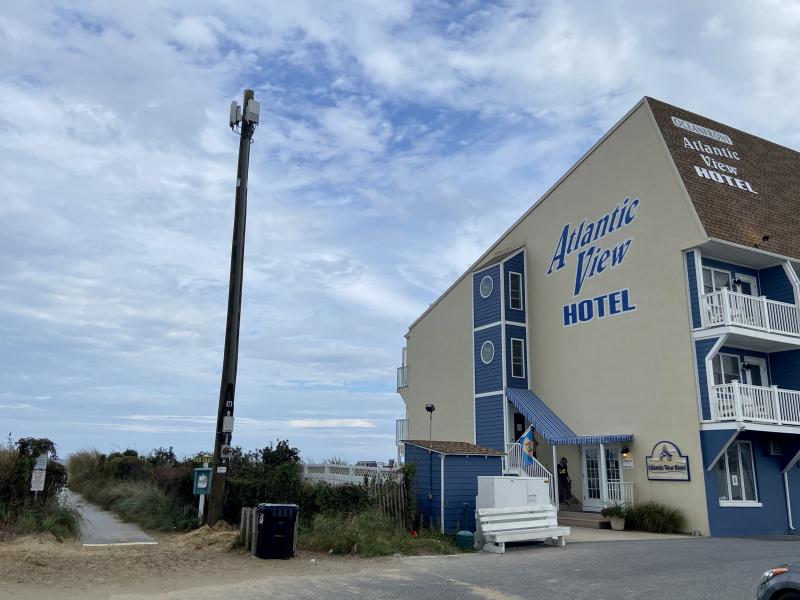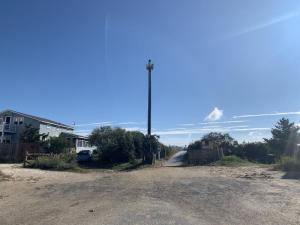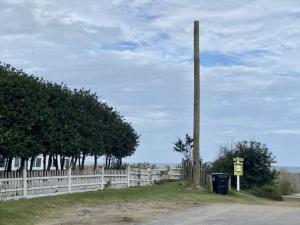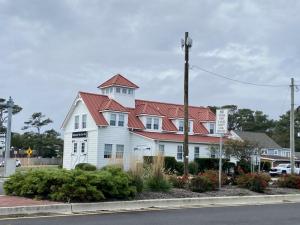5G poles creating eyesores in Dewey Beach, residents say

A state law aimed at enhancing wireless communications is creating eyesores, Dewey Beach merchants and town officials say, with the installation of towering 5G cell poles adjacent to the beach.
The worst part is, officials can do very little about it, interim Town Manager Jim Dedes said.
“Clearly, we’re not happy. We don’t want them here,” Dedes said. “The poles are ugly as sin. We have our attorney looking into it, but it doesn’t seem like it’s a battle we can win.”
In 2017, Gov. John Carney signed the Advanced Wireless Infrastructure Investment Act, authorizing wireless providers to install poles on state rights of way to increase connectivity. In Dewey, roughly 90 percent of streets are state-owned; only Chesapeake and Carolina streets are maintained by the town, Dedes said.
Delaware Department of Transportation has granted permits to Verizon to install 13 poles and to Tilson to install five poles on state rights of way, Dedes said. Tilson is also targeting locations on Chesapeake and Carolina streets, culminating in 20 poles in a town roughly one mile long and two blocks wide.
“The town has not given a go-ahead [for Chesapeake and Carolina], and we are reviewing our options,” Dedes said, adding that the legislative goal was to target rural areas, and there are no connectivity problems in Dewey so the poles are not needed.
Legislation also allows the poles to be as high as 50 feet, higher than the town’s maximum building height of 35 feet, Dedes said.
“We told them we don’t want them higher than 35 feet,” Dedes said. “They have to cut one down. They said they’ll use existing poles if there are no live wires or transformers on it, but if they can find one without that, it’s a miracle.”
Dedes said he has received emails from several distressed property owners, and that even if the state can help, federal legislation will likely trump state legislation.
At the Sept. 11 town commissioners meeting, Mayor Dale Cooke said other towns have been fighting against the poles with little success.
“It worries me that we have multimillion-dollar homes on the ocean side,” Cooke said. “They’re placing telephone poles at the end of the street, and we already have some telephone poles there and didn’t want any more.”
Beth Caruso, who works for Rehoboth-by-the-Sea Realty, said the poles distract from the beach view.
“The 5G towers are the bane of my existence,” Caruso said. “I can’t believe the state of Delaware would do that to the coastline. I find it astonishing. The public had a right to understand what would happen to our coastline before this started.”
Sen. Ernie Lopez, R-Lewes, said his office has received just a handful of calls about the aesthetics of the poles and had not been contacted by appointed or elected municipal officials in Dewey Beach.
“To my understanding, planning, development and agreed-upon locations of enhanced 5G capabilities in the Cape Region had been ongoing for over two years through direct negotiations between Verizon and each individual municipality, including Dewey Beach,” Lopez said. “I will be communicating with the mayor and commissioners in the coming days to see where they feel my fellow legislators and I could be helpful in mediating this concern.”
Speaker of the House Rep. Pete Schwartzkopf, D-Rehoboth Beach, could not be reached for comment.
DelDOT issued a statement on behalf of Community Relations Director Charles “C.R.” McLeod that said Delaware Code and Federal Communications Commission rules dictate how DelDOT handles wireless equipment and facilities, which go through DelDOT’s permitting process to authorize placement before they are constructed.
“DelDOT’s review is solely based on regulations, policy and design guidelines that apply to all other utilities utilizing the right of way,” McLeod said. “That being said, our reviews are centered around the safety of the traveling public and our infrastructure. Delaware Code requires we treat small wireless companies as utility companies.”
























































